Celebrated storyteller Hal Bodner stopped in to let me grill him a bit about two of the latest additions to his dark, daring, fabulous, funny, exciting, and eclectic body of work.
A Study in Spandex
Grieving his husband’s untimely death, Alec Archer doesn’t feel up to donning the Whirlwind’s skintight turquoise costume to defend Centerport against yet another supervillain.
But the evil genius who calls himself the Zookeeper doesn’t care about Alec’s feelings. The Zookeeper has chosen Centerport as the perfect place to demonstrate his latest creation—a genetic process that converts harmless house pets into lethal bioweapons.
Whether he’s battling giant spiders, rescuing the city from a vicious army of mutated puppies and kittens, saving a child from an angry grizzly bear, or simply babysitting a pair of awkward newbie superheroes who are more trouble than they’re worth, Alec dutifully does his best, even though his heart isn’t in it.
Unfortunately, the Whirlwind’s unique biology proves irresistible to the Zookeeper. Captured and horribly tortured to unlock the secrets of his superhuman genetics, Alec’s despair and grief threaten to overcome him, and the outcome of the Whirlwind’s final battle with the Zookeeper is far from certain.
“Funeral Games”
Originally published in the Sisters in Crime anthology Avenging Angelenos, this very dark, very funny story is about two rival cemetery owners/funeral directors who compete for celebrity bodies. As their resentment of one another grows, the competition escalates into increasingly macabre territory.
The Interview
Thanks for joining me, Hal Bodner! I’ve always enjoyed our conversations, and I’m anxious to learn more about the work you’ve been doing lately. So, let’s get to it…
(1) Lugubrious Laughs. When I called for guests with “dark aesthetics,” people might not have known I meant to include dark humor, but I certainly did, and your work excels at delivering both chuckles and chills. The title of A Study in Spandex, not to mention the idea of an army of mutated house pets, promises comedy, but your book’s description emphasizes “despair and grief,” promising a melancholy streak as well. How and why do you combine these elements? What do you expect readers to feel coming away from A Study in Spandex?
HB: Oh, wow. Let’s just DIVE into the deep end, shall we? LOL!
All kidding aside, that’s a pretty serious question, and I think it hearkens back even as far as Bite Club, my first novel.
Humor, I think, ultimately comes from pain. Some of the most heartbreaking moments in life can also, if handled properly, become the funniest. There is always something to laugh at when things start getting extreme – you know that old saying, “from the sublime to the ridiculous?” Well, I think there’s truth in that. In fact, I think if you dissect a lot of humor, you can often find some element that, had it not been deliberately made funny, might be alarming.
Look at The Three Stooges, for example. Those guys are actually maiming each other, yet we laugh.
I also think that humor is the best way to make a point without being obvious. People remember tragedies, but they also sometimes block them out. If the experience is too horrible or painful for them, they can go numb – even to the point of being unable to remember the event. Yet I cannot think of any situation where someone would block out something funny. They might not see the humor or be offended by it – especially in today’s environment, or it might even be forgettable in the general sense. But the odds are, if done right, a point made humorously will tend to stick with people for much longer. They may revisit it from time to time and, hopefully, learn something from it.
I also think there can be a lovely shock value from irreverence. That’s one of my favorite techniques. If I can get my readers to think, “Wait a minute. He’s NOT going there, is he? He can’t. He wouldn’t dare! Ohmigosh. He DID!” and have them fighting not to laugh at something their mores and belief systems tell them they should NOT laugh at, I’ve made an impact. I may even have gotten them to look at their closely held values and conventions in a very different way – and I think that’s always part of what a writer should try to do.
(2) Scarlet Studies. Picking on your title again—A Study in Spandex echoes Arthur Conan Doyle’s Sherlock Holmes novel A Study in Scarlet, which seems like an unusual reference point for a superhero adventure story involving bioweapons and superhuman genetics. Did classic detective tales influence you, and, if so, how? Similarly, does your background in the horror genre shine through in Alec Archer’s story/stories, and, if so, how?
HB: I’m best known as a Horror author, yet, ironically, I never felt that very much of what I write is “horror” per se. I’ve always considered myself as primarily a writer of capers. That’s what Bite Club and The Trouble with Hairy really were – capers. They weren’t even real mysteries – in both books, we knew very early on who the bad guy was. But since one of the main characters happened to be a vampire, I got pegged as a Horror writer.
I think, once that happens – once an author gets a label like that, especially if it’s due to a really successful book – the natural reaction is to buy into it. So, I found myself writing what was ostensibly Horror for a decade or so. What I also found, however, was that my definition of “horror” was very different from how most other people think of it. For example, monsters and crazed serial killers aren’t very real for me. Loss, however, is.
You already know this, but some of your readers may not. I lost my first husband (though it was before same sex marriage was legal) when he was only 40. It was completely unexpected, a freak illness, complicated by medical malpractice. THAT, to me, is what horror truly is. So while there are traditional Horror elements in Fabulous in Tights and A Study in Spandex – and while “Funeral Games” is unquestionably macabre, the ultimate “horror” (particularly in Fabulous in Tights) isn’t supernatural at all. Nor does it originate in a character’s psychosis or delusions, as it does in the serial killer type books. The horror elements emerge from what was a simple misunderstanding, and a different way of looking at things – it’s the tragic consequences which become horrific, so to speak. And yes, in Spandex in particular, there’s quite a bit of gore (and a pretty intense torture scene which, I hope, is also very funny), and some of the murders in Bite Club are a bit tough to take.
But those are mere “moments” of horror. The lasting impact – the horror elements which I hope will remain with the reader – have nothing to do with people being skinned alive with red-hot vegetable peelers, or with evil djinns emerging from a hot tub (both of which I’ve done, by the way!). The type of horror that interests me comes from some of the very real, very natural events that will inevitably affect all of us at one point or another in our lives.
(3) Skintight and Super. Regarding Alec Archer, your book’s description presents him as reluctant but dutiful—how else would you describe him? Will readers fall in love with him? Why or why not?
HB: I’m very fond of Alec Archer – precisely because he is so terribly torn between his private life and his secret identity. I set out to create a character who was really likeable in the “real” world but who became kind of a dick whenever he was forced to step into his superhero role.
Alec Archer embodies many of the qualities of what I think of as the ideal husband. Not only is he incredibly good-looking (What can I say? I’m shallow that way. Have you seen my husband? He’s pretty hot!), but he’s also very loving. He adores his husband, Peter – not in an unhealthy or obsessive way, but in a way where he never fails to appreciate him or takes him for granted. In some ways, Alec is one of those 1950s housewives whose life revolves around their husbands. He even uses some of that kind of language when he’s talking about the relationship.
But that doesn’t mean that he’s an insipid, besotted milquetoast. Alec is also a very effective and somewhat hard-nosed businessman, and even brusque and a bit impatient in his professional life. I made him that way on purpose. It’s a harbinger to what he’s like when he dons his cape and becomes the Whirlwind.
As the Whirlwind he’s an asshole! He can be quite witty and sometimes gets himself into very funny situations, but he resents the hell out of having to do the things that superheroes are expected to do, and he’s not very adept at hiding how he feels. He’s impatient, caustic, and intolerant. While he’s certainly aware of having to put on a good face for the press, he sort of resents that, too. The only reason he does it at all – and I think this may be one of the Whirlwind’s redeeming qualities – is that he feels a strong responsibility, even if he hates every minute of it.
As a mildly interesting side note, I was absolutely flummoxed by some of the comments in the early reviews – particularly Publishers’ Weekly, who ought to know better. In modern times, some readers are apparently incapable of distinguishing between the voice of the author and the voice of the character! There is a scene early in Fabulous in Tights where the Whirlwind enters a burning building – with his usual resentment at having to do it – to rescue a group of people who are the very antitheses of what he considers the “ideal” victim. He has this fantasy of always being the proverbial knight in shining armor, rescuing a series of handsome young men who will all, out of gratitude, fall helplessly in love with him – a temptation he will resist out of nobility and loyalty to his husband. Of course that never happens in real life! In this case, one victim is a sharp-tongued older woman, one is morbidly obese, one is hysterical, and another is confined to a wheelchair. The Whirlwind, true to form, is not only not gracious, he’s borderline insulting.
The Social Justice Warriors and the PC police went wild! They attacked with as much sanctimony as they did gusto. They were determined to attribute the views and motivations of a fictional character… to me! What’s interesting to me is that, if you read the scene carefully, you see that though the Whirlwind starts out as a shallow and judgmental dick, as the scene progresses, he actually grows a little as a person, and becomes less judgmental as he gets past the physicality of one character and discovers he likes her as a person. It’s actually designed as a scene about positivity – but the PC types were far more interested in showcasing how clever they were at “exposing,” well, whatever it is that they pride themselves on exposing, than they were in actually taking into account the scene as a whole.
The thing that set them off, by the way, was a comment the Whirlwind makes: “Gay guys and fat chicks. It’s the perfect combination. Like pearls and basic black.” I happened to think it was a very funny line that was quintessentially this particular character’s expression of the growth process he’d experienced. It shows that, though he certainly hasn’t achieved any pinnacles of tolerance, he’s at least farther along than he was when he walked into the building. Sadly, though, to prevent even more outrage and possible cancelling, it had to be cut.
(4) Super Gay? Your bio (see below) points out that your novel Bite Club made you one of the top selling gay authors in America, and to add a personal note, your story “A Rift in Reflection” in the anthology Chiral Mad 3 ranks as one of my favorite gay-themed shorts of all time. Does A Study in Spandex have specific gay appeal? Why or why not?
HB: Absolutely. In fact, I’ve been told it’s “too gay”! LOL. Again, though, I think it’s interesting by what some people mean when they say my work is “too gay”. I generally avoid graphic erotica unless I’m specifically hired to write a paranormal romance like In Flesh and Stone – which is incredibly erotic!
However, I’m a Gay rights advocate from way back, and I was in the trenches, so to speak, for the duration of the AIDS epidemic in the 80s and 90s. So, I feel very strongly – perhaps more strongly than I feel about almost anything else in my life – that Gay men are not just little pink versions of straight people. We have a history, a culture, and even a lifestyle that is uniquely ours, and that is not always palatable to straight people – even the most PC of them. Not only do I not shirk at presenting my characters as Gay men, living openly gay lives, but I feel a strong responsibility to do so. Nor do I shy away from, in some cases, presenting some of what might be seen as our cultural shallowness, or our purported “obsession” with sex, the graphic language we sometimes use, or the attitudes we espoused within the community.
Note that last part is in the past tense. Not to get too political, but I think the current alphabet soup of LGBT-etc. politics is slowly erasing many of the things that were quintessential aspects of traditional gay male culture and, under the guise of social progress, is acting as a kind of forced assimilation. I not only resent that, but I resist it as best I can in my life and in my work, even while realizing that I may be in the minority and that my views may be considered “old fashioned” and out-of-date.
(5) Subtext in Spandex. A lot of superhero stories these days tend to plant subtext beneath the battles between heroes and villains, stakes that reflect on politics, environmental issues, etc. Should readers expect subtext from the conflict between the Whirlwind and the Zookeeper? Why or why not?
HB: Oh, I’m all about subtext! But I don’t write overtly political “message” fiction. I find it tedious. The vast majority of it is overly preachy.
For example, I recently read a short story by a trans author that was more of a manifesto, or even an accusation, than it was a piece of fiction. It was offensively aggressive and filled with prose that was almost slogan-like. Reading between then lines, I thought it indicated that the author was still struggling with their own issues and still weren’t comfortable in their own skin. That’s not only a sad place for anyone to be, but I have to ask what the purpose is of injecting all that into your fiction in that particularly unsubtle way? True, it might be therapeutic, but if so, it’s very public therapy. The people who are inclined to agree with you are probably not the audience you want to reach. They’ve already gotten the Message, and there seems little point in hammering it in unless the author is desperate for validation. On the flip side, the people who need to be reached – the ones who either don’t understand the Message, or who are already opposed to it, are likely to be put off and resentful about being “lectured” to.
So, ultimately, what’s the point?
Subtext, however, when properly done, “lurks” and, if you’re lucky, may even haunt a reader and force them to re-evaluate their mores, opinions, views, and core values – even if it works subliminally. I think that kind of thing results in a truly lasting change far more effectively that hurling ostentatiously socio-political rhetoric into a reader’s face.
(6) Celebrated Bodies. “Funeral Games” presents two cemetery owners struggling for relative fame by trying to claim famous corpses for their businesses. The story seems to poke fun at celebrity and fandom, but the fun might be affectionate. How do you feel about the craze for fame, especially in Los Angeles, and how do those feelings affect your writing?
HB: I love Los Angeles – especially its quirkiness. Twenty years ago, LA was one of the best cities in the world to live in. Sadly, many of the things that made it so wonderful – notably the freedom that comes from not being particularly grounded in anything – have also made it highly vulnerable to many of the less attractive aspects of modern society. That said, emotionally, I am unquestionably an Angeleno! We have a way of thinking here, and a world outlook – or, at least we did – that I buy into completely. Yet, I also pride myself on being self-aware, and intelligent enough, to also see the absurdity of it. I don’t think I’d be able to keep any of that stuff out of my writing if I tried!
The quest for fame thing has always been part of the rubric of LA insofar as “Los Angeles” is as much of a concept as it is a physical city. I’m very fond of saying this about LA:
Many people who live here don’t understand the difference between being “unique” and being “special” in that everyone is unique, but few people are truly special. And because we are a city of surfaces, they believe that eccentricity is an outward manifestation of the “specialness” they aspire to. But Los Angeles is still a very young city in many ways, and true eccentricity requires a kind of venerable foundation that LA lacks. So instead of being eccentric, they come off as merely weird. And besides, they seem to forget that on the East Coast – which has that kind of a foundation, calling someone “eccentric” is not a compliment. It’s something to avoid and, if you are found to be “eccentric,” they don’t celebrate you – they lock you in an attic!
(7) Word Games. You have a lovely vocabulary. I don’t recall the last time I saw the word “harridan,” but it appears twice in “Funeral Games!” How would you describe your style in general? Am I reasonable in saying it’s a bit more elevated than standard genre fare?
HB: Thanks. I’ve been told that about my vocabulary before. But… “elevated”? Good gods! I hope not! LOL.
Here’s the thing: I believe that an author’s task, and their goal above all others, should be to communicate to the reader. I don’t have any patience whatsoever with hoity-toity “intellectual” fiction. The whole notion of “speculative” horror and “literary” fiction leaves me cold. That said, there’s no question that there are readers out there who get some degree of satisfaction out of reading things that, to my mind, are overly obscure and deliberately obtuse.
I honestly don’t know how else to explain the popularity of something like Mark Danielewski’s House of Leaves, or even Elizabeth Kostova’s The Historian. I found them to be virtually unreadable. Yet, when it comes to something like Andy Weir’s The Martian, I was transfixed the whole way, even though it’s not a particularly easy read. I think that’s because Weir never allows style to triumph over story, and, in the end, isn’t story what it’s all about?
So, I think – or, at least, I hope! – that when one of my characters uses a word like “harridan,” the antiquated vocabulary is organic to the character using it. In “Funeral Games,” Mickey is kind of persnickety (another antiquated word! LOL. But I think it’s the right word to describe him). He’s fussy and petty, and while he’s not gay, there’s a prissiness about him that is traditionally seen as a more feminine trait. There’s an aura of old-fashioned-ness surrounding him; in some ways, he’s out of touch. So, someone like Mickey would definitely use a word like “harridan.” In fact, I think he also calls Julia a “fishwife” at one point, doesn’t he?
I always try to use simple language in my work, but that doesn’t mean I have to sacrifice intelligence. I’ve notice, for example, that sometimes something as simple as rewriting a sentence, and changing it from active voice to passive, or swapping independent clauses for dependent ones, can create the effect of using elevated language without compromising clarity.
That said, In Flesh and Stone was deliberately written with so-called “heightened” language. The protagonist in that book is an artist – a painter. He sees the world in artistic terms. His experience of reality is more intense than normal people’s, more vibrant, perhaps less well-grounded but ultimately more real. His colors are brighter, his emotions are more volatile. As a result, I felt that the language of the book ought to reflect that.
While we’re on the subject, I am ASTOUNDED by how many purported “authors” do not actually know how to write! They don’t understand the parts of speech, or basic grammar rules, or how to structure a sentence. Mention the word “diagramming,” and you’ll get a blank stare in return. I don’t think they understand that writing is a craft as much as it is an art. It’s not that they’re not creative – some of them are far more creative than I’ll ever be! However, they lack the ability to effectuate that creativity in prose. The result is a lot of “really cool” ideas, or “nifty twist endings,” in stories that ultimately fail.
I actually stress over individual word choices. I’ll often spend hours (sometimes days) rewriting a single paragraph until it says exactly what I want/need it to say. I worry about active vs. passive voice in a sentence and which is more effective. And I actively struggle to avoid “gerund-based” prose, partly because I find it awkward and oppressive, but also because I’m French – and we rarely use gerunds! LOL
(8) More Word Games. You relate much of “Funeral Games” through snappy dialogue, which makes the story very easy to imagine as a screenplay or on the screen. Why do you rely on dialogue to such an extent for characterization and plot development? How does the screen influence your imagination and writing?
HB: I believe characters express themselves in two ways: by what they do, and by what they say. A character that is based purely on a physical description is almost certainly going to be two dimensional at best, and at worst a cliché. You can do it in other ways, of course. Christopher Moore, for example, opens his novel Noir with the line “She was a blonde. A dirty one.” In a mere seven words, a perceptive reader will instantly know who “she” is, who the speaker is, and what the tone of the book is going to be. Of course the details will need to be filled in later. But the essence is already there.
Believe it or not, I was trained as a playwright, and I’ve even got a BFA to show for it! I think that working in the Theatre helped give me an “ear” for dialogue that has stood me in very good stead as someone who now writes mostly prose. I say “mostly” because once or twice a year, I may find myself hired to do what we call “taking a pass” on a movie script. It’s generally limited to dialogue work, but every so often I’m asked to do something a bit more comprehensive. I’m not a member of the Guild, and I don’t want to become one, so it’s all very hush-hush. The people who hire me are almost always the writers themselves and not the studio or production company, and they pay me out of their own pockets. In what may seem like a typical example of “Hollywood” attitudes, although I’ve certainly got the necessary skill, what makes me even more attractive is that I have exactly zero interest in taking any credit! I honestly have no desire to see my name on the screen.
(9) Future Funerals. You’ve given me the advance tip that “Funeral Games” is bound for a collection tentatively titled In Sad Cypress expected from Cemetery Dance in late 2024. What else can readers expect from this collection? What does a Hal Bodner collection look like?
HB: Well, it will certainly be very funny at times. But some of the stories will also carry an emotional gut punch. You’ve read “A Rift in Reflection”, so you know what I mean by that. Cemetery Dance is primarily a dark fiction/horror publisher, so the focus will be on stories within that genre. However, I’ve also included a couple of mystery shorts.
In fact, two of my favorites, neither of which is strictly horror, will be in it. “The Baker of Millepois,” which is a rather charming traditional-style French fable – that happens to be about cannibalism – and “I Am The Ink,” which I think is a truly unique, thought-provoking, and often very funny approach to Noir.
(10) Access! How can readers learn more about you and purchase your works (please provide any links you want to share)?
HB: The best way is via www.halbodner.com. Most of my novels that are currently in print are listed there, and you can click right through to the Amazon purchase pages. Though, to be honest, I’m not sure if the links lead to print format (which I prefer), ebook format, or the audio books. But I think Amazon makes it easy to just click on whichever you want. I’m not entirely sure because I’m a complete Luddite when it comes to online stuff. I once bought my husband chopsticks with little pandas on them. I paid something like $35 bucks, so I assumed they were really nice chopsticks. It turned out that I’d inadvertently bought six boxes of 12 pairs of chopsticks each! After that, whenever I want/need something ordered online, I ask Gene to do it for me.
The short fiction is harder to find. Some of the older anthologies may be out of print, or available only as ebooks. I think Amazon has a search function that helps with that. Every time I have a short piece come out, I go to Amazon and figure out how to make the relevant anthology show up on my Amazon page. Whether I’ve always successfully accomplished that is anyone’s guess!
Note from Andrew: The images of book covers throughout the interview, including the anthologies, are also direct links to Amazon sales pages. Most of my links default to ebook formats, but you can switch to other formats from the Amazon pages.
About the Author
Multiple Bram Stoker Award nominee Hal Bodner’s freshman novel, Bite Club, made him one of the top selling Gay authors in America. Best known for his deeply emotional horror short fiction and for his comedic mysteries and capers, Hal spent 35 years working in Hollywood as an entertainment lawyer and was one of the founders of the prestigious Ovation Awards, the West Coast equivalent of Broadway’s Tony Awards. He is married to a wonderful man, half his age, who never knew that Liza Minnelli was Judy Garland’s daughter. Somewhat stereotypically, they have a poodle.
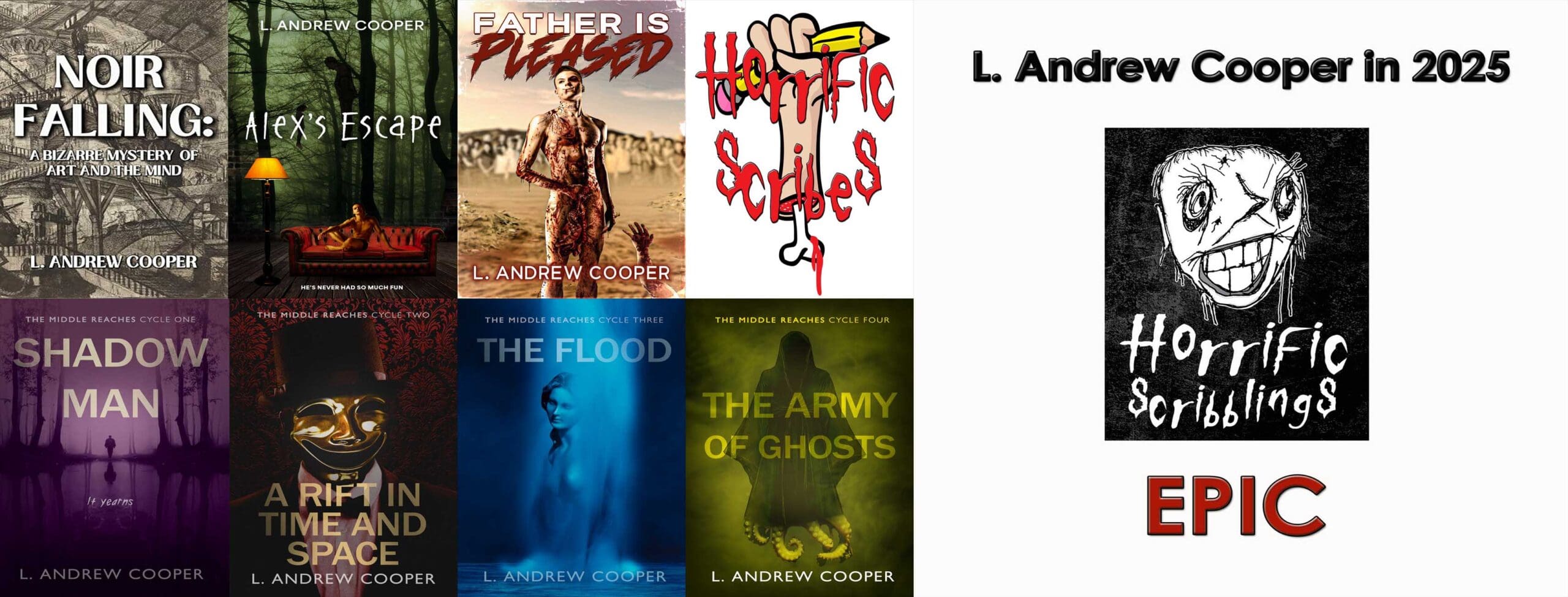
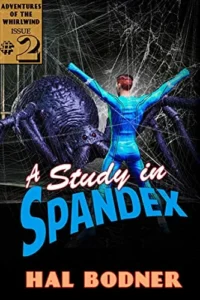
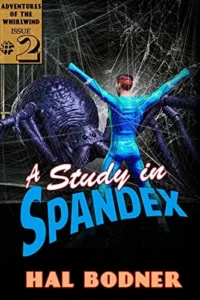


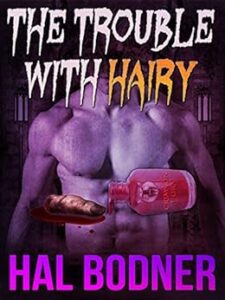
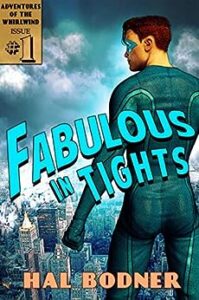
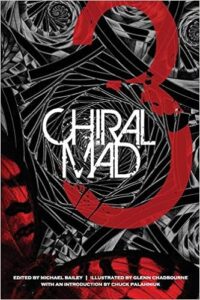
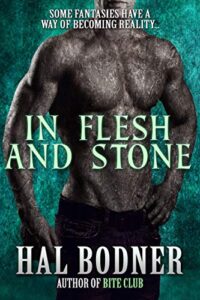
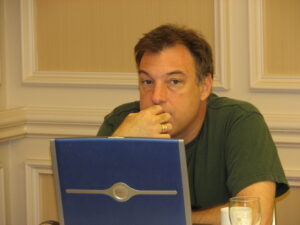
Comments are closed.